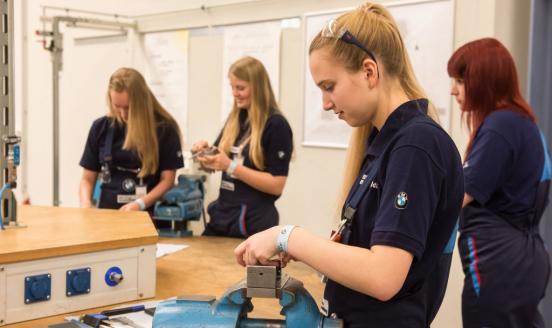Productivity parity is the road to gender equality
Women can reach a higher potential in the workforce if men begin to play their part.

Gender equality is good for society and good for the economy, though a huge amount remains to be done to close longstanding gaps and imbalances. To increase productivity and help the European economy rebound, policymakers need to encourage more men to stay home.
Specifically, men in heterosexual partnerships need to do more than welcome women into their paid employment spaces -- they also need to work more in their own homes. The International Monetary Fund has repeatedly and recently urged the EU to focus on increasing productivity to combat a skills shortage and low growth. If men pulled a bigger share of their weight regarding caregiving and house upkeep, their partners would have a better chance of reaching full earnings potential and thus be able to help Europe prosper as it should.
Statistics show that even when women have more access to better jobs and increased external child-care support, home life caregiving still holds them back. In Denmark, an analysis of country-wide administrative data found that between 1980 and 2013, gender pay inequality had closed to 24% from 46% but did not narrow further.
The Danish researchers define “child penalties” as career setbacks related to planning and caring for kids, which in turn had a negative impact on women’s likelihood of promotion and wages. Danish women continue to take on more family duties, which the authors describe as female “preference”. Another interpretation is that women feel they must do more at home and men feel that they do not.
Even when a woman out-earns her partner, her time still does not come first. Among married US couples, when a wife is the primary earner in her marriage, her husband spends 1.6 hours less at paid work and 8.8 hours more on leisure on average each week. A secondary-earning male spouse has the equivalent of a full workday more to spend on his own pursuits, while he continues to spend less time than his partner on housework and caregiving. That is 7.8 hours combined for the husband and 11.2 hours combined for the wife. In contrast, when the husband out-earns his wife, she spends 16.7 hours a week on caregiving and housework, while he puts in just 5.8.
This explains why women may not be earning as much as their male peers at the office, even when they are outearning the man who shares their living quarters. The men they are competing against at the office have more support at home than they do. The same study shows that women who are the sole earners in their household spend almost the same amount of time on housework and caregiving as their spouses. This amounts to a combined 9.3 hours for the wife compared to 10.1 hours for the husband. But if the male partner is the sole earner, the wife puts in a staggering 24.6 hours a week on housework and caregiving, compared to her husband’s 5.9 hours.
Legal scholar Linda Hirschman identified this problem in her seminal essay “Homeward Bound,” in 2005, when she implored professional women to take career building as seriously as their husbands, who they met at elite schools, do. Many women have taken this advice, while others have freely chosen to limit their career in service to their spouse’s. But husbands have not been similarly willing to swap roles.
Europe cannot afford for talented women to be under-performing due to constraints at home. Policymakers must highlight from the top-down that men are not contributing enough to society until they are doing enough in their own homes. Author Darcy Lockman says sociologists have documented that there is entrenched “male resistance” to picking up more of the household slack and individual women are reluctant to challenge them because “there’s always going to be someone whose husband is doing less.”
That leaves the government to set the tone. To close the gender gap, countries could provide tax credits for taking on caregiving duties while working, in addition to the efforts they have already made to encourage men to take parental leave. Employers could further set expectations that workers would be eligible for more benefits from part-time jobs if workers, male or female, could document the amount of time they are putting in on “the second shift”.
For the European economy to grow to its full potential, women need to be able to reach their own potential as part of the workforce. It is time for the other half of society to step up so they can make it happen.


